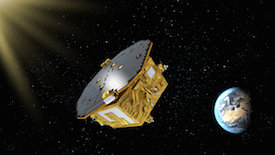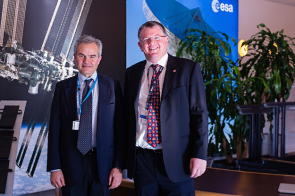LISA Pathfinder lead scientist awarded prestigious prize
6 March 2020
Professor Stefano Vitale, principal investigator of ESA's LISA Pathfinder and currently the chair of ESA's Science Programme Committee, has been honoured with the 2020 Tycho Brahe Medal for leading the ambitious mission that demonstrated technology to detect gravitational waves from space. |
| Artistic view of LISA Pathfinder in space. Credit: ESA–C.Carreau |
The annual prize has been awarded by the European Astronomical Society since 2008 to acknowledge the "development or exploitation of European instruments or major discoveries based largely on such instruments".
A Professor of Physics at the University of Trento, Italy, Stefano Vitale joins a prestigious list of winners that have been pushing the boundaries of contemporary research in space science and astronomy across Europe.
LISA Pathfinder was designed to test the extraordinary technology needed to observe gravitational waves from space. Predicted by Albert Einstein's general theory of relativity in 1915, these ripples in the fabric of spacetime were observed for the first time using ground-based detectors in 2015, leading to the impressive growth of the new burgeoning field of gravitational wave astronomy over the past five years.
Meanwhile, LISA Pathfinder – launched in December 2015 and operated between March 2016 and June 2017 – has paved the way for future missions by flight-testing the concept of gravitational wave detection from space to a much greater precision than originally required.
 |
| Stefano Vitale (left) with Paul McNamara, ESA's LISA Pathfinder project scientist (right). Credit: ESA–C.Carreau |
The Tycho Brahe Medal recognises the scientific leadership of Professor Vitale, who has been Principal Investigator of the LISA Technology Package – the core scientific payload on LISA Pathfinder – since 2003, having "demonstrated with extraordinary precision the technology required for the future Laser Interferometer Space Antenna whose fundamental aim is to observe low frequency gravitational waves from space."
Capitalising on the successes of LISA Pathfinder, the Laser Interferometer Space Antenna, or LISA, is currently under study at ESA and is scheduled for launch in the early 2030s. The trio of satellites will be the first space-based gravitational wave observatory, investigating some of the most powerful events in the Universe such as the mergers of supermassive black holes lurking at the core of distant galaxies.
The full list of Tycho Brahe Medal winners is provided here. The award ceremony takes place on 30 June during the annual EAS meeting, held this year in Leiden, The Netherlands.
Notes for editors
Read the European Astronomical Society press release here.
More about LISA Pathfinder
LISA Pathfinder was an ESA mission with important contributions from its member states and NASA. The LISA Technology Package payload was delivered by several national funding agencies and ESA, in particular: Italy (ASI); Germany (DLR); the United Kingdom (UKSA); France (CNES); Spain (CDTI); Switzerland (SSO); and the Netherlands (SRON). LISA Pathfinder also carried the Disturbance Reduction System payload, provided by NASA-JPL.
More about LISA
LISA is an ESA-led mission with important contributions from NASA. It was selected as the third large (L3) mission in ESA's Cosmic Vision programme in 2017. The LISA Consortium, led by the Max Planck Institute for Gravitational Physics in Germany, involves several ESA Member States and the US.


